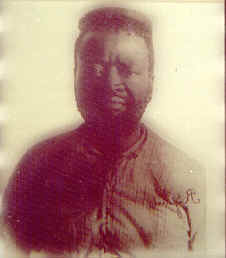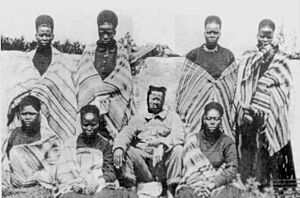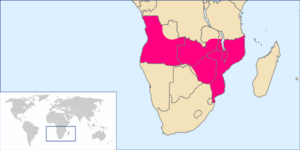Gungunhana facts for kids
Ngungunyane (born around 1850 – died December 23, 1906) was an important African king. He was also known as Mdungazwe Ngungunyane Nxumalo or Gungunhana. He ruled the Gaza Empire, which is now part of Mozambique. Ngungunyane was the last king of this empire.
He was nicknamed the Lion of Gaza. He ruled from about 1884 until December 28, 1895. On that day, he was captured by the Portuguese army, led by General Joaquim Mouzinho de Albuquerque. Instead of being executed, he was sent away from his home. He lived the rest of his life in exile, first in Lisbon, Portugal, and later on Terceira Island in the Azores.
Contents
Biography
Ngungunyane was born around 1850. His birth name was Mdungazwe. This name means 'one who confuses the people' in the Zulu language. He used this name until he became king in 1884. He was likely born near the Limpopo River in the Gaza territory. This area is between the Zambezi and Incomati rivers.
His father was Mzila, who was king of Gaza from 1861 to 1884. His grandfather was Soshangane. Soshangane was a powerful leader who founded the Gaza Empire. He led an army north from Zululand.
Early Life and the Gaza Empire (1850–1864)
Mdungazwe grew up in a time of big changes and challenges. His grandfather, Soshangane, was the king of the Nguni people. They were related to the Swazi. Soshangane led a strong army that moved north during a time called the Mfecane (The Great Scattering).
As they moved, Soshangane convinced many tribal chiefs to join him. They settled between the Maputo and Zambezi rivers. Here, Soshangane founded the Gaza Empire. He named it after his own grandfather. The empire started with about 56,000 square kilometers (21,600 sq mi) of land.
When the Nguni people arrived, they changed the peaceful life between local people and Portuguese traders. There were many conflicts and forced takeovers. This created a feeling of fear for many years.
Founding the Gaza Empire
After almost twenty years of travel, Soshangane and his people settled in the Limpopo River valley. They built a village called Chaimite and made it their capital. Portugal, which had been in the area for a long time, sent a group to meet Soshangane in 1840.
The Portuguese wanted to make a friendship treaty. Soshangane met with them but said he saw no benefit in a treaty with the king of Portugal. Even though gifts were exchanged, attacks continued.
Around 1850, Mdungazwe was born. As a prince, he was trained to be a warrior. From a young age, he joined the yearly journeys his father and grandfather took.
A Family Problem for the Throne
When Soshangane died in 1858, his sons Mzila (Mdungazwe's father) and Mawewe fought for the throne. Mawewe won the fight. In 1859, he tried to attack his brothers and their families. Mzila escaped to the Transvaal. There, he gathered an army to fight his brother. Mdungazwe likely went with his father to escape Mawewe's attacks.
The Portuguese thought Mawewe would be as aggressive as his father. So, they decided to join forces with their neighbors, the Boers, and many local tribal leaders. These groups also felt threatened by Mawewe. In 1861, the Portuguese and Boers agreed to an alliance against Mawewe.
The Portuguese became even more determined when Mawewe demanded that their colony at Lourenço Marques (now Maputo) pay him tribute. He even threatened to destroy Portuguese interests if they didn't pay. The Portuguese governor responded by sending Mawewe a rifle cartridge, meaning they would fight instead.
Civil War for the Throne
War began. On November 2, 1861, Mzila arrived in Lourenço Marques to accept Portuguese help. In return, he promised his loyalty to Portugal. From this point, Mzila claimed he was the rightful king, and the war grew.
A major battle happened in late November 1861. Mzila won, even though he had fewer soldiers. On November 30, he met with the Portuguese governor.
On December 1, 1861, Mzila signed a treaty. It stated that he was a Portuguese subject. This agreement was approved by the Portuguese government. Another big victory for Mzila in December 1861 strengthened this alliance. Portugal gave Mzila two thousand rifles, ammunition, and flints. They also helped him get support from the Boers and local leaders. These leaders preferred to be under the distant king of Portugal rather than Mawewe. All this helped Mzila greatly.
The war lasted until 1864. The capital of the kingdom moved from the Limpopo River valley to Mossurize. From 1864, Mzila was the clear ruler of the Gaza Empire. With these events, Mdungazwe became a possible successor to the throne.
Mzila's Rule and European Competition (1864–1884)
After the war, Mzila focused on making his power stronger and expanding the Gaza Empire. He ruled strictly, like his father. He often traveled long distances to keep control of his lands. The capital stayed at Mossurize. The old capital, Chaimite, became a special place for remembering past events and honoring ancestors.
Even though Mzila signed a treaty with Portugal, his warriors sometimes attacked Portuguese colonies. This caused tension, despite Mzila's promises of friendship.
Competition Among Europeans
At the same time, European countries were competing more and more for control of African land. They sent many expeditions to explore and claim new territories. More missionaries and traders visited the Gaza land. Portugal wanted to create a large area of Portuguese colonies across southern Africa. This area would stretch from Mozambique on the Indian Ocean to Angola on the Atlantic.
In the early 1880s, as Mzila's rule was ending, competition among Europeans grew fast. Their expeditions went deeper into Gaza territory. There was also more pressure on Mzila to allow mining for minerals. Mzila tried to keep a good balance with Portugal. In 1882, he visited Lourenço Marques with his troops. He promised his loyalty and explained the attacks on Portuguese colonies. He was welcomed by the governor. Later that year, Mzila even asked for a Portuguese flag to fly over his camp.
Formal Relations with Mzila
In 1883, Portugal decided to send an ambassador to Mzila's court. António Maria Cardoso, who knew the region well, was chosen. He traveled to where Mzila was staying and was well received. Another officer, Joaquim Carlos Paiva de Andrada, also met with Mzila that year.
However, European powers were demanding that a colonizing country must show it could truly use and manage its lands to justify owning them in Africa. Portugal decided to strengthen its presence in Africa. They organized big expeditions, like those of Roberto Ivens and Hermenegildo Capelo. These trips aimed to show that Portugal could control the African interior.
Mzila did not know he was in his last year of life. He also didn't know that European diplomats were meeting at the Berlin Conference. They planned to divide Africa among themselves. When Mzila died in August 1884, Europeans were deciding the future of Gaza.
The Succession
King Mzila had four sons: Mafemani, Hanyani, Mdungazwe (Ngungunyane), and Mafabazi. Mdungazwe became very important in his father's court. When Mzila died, Mdungazwe was not the rightful heir. That position belonged to his half-brother, Mafemane.
Mdungazwe fought for the throne and defeated Mafemane. This made his other two half-brothers, Hanyani and Mafabaze, flee to safety. So, in 1884, Mdungazwe became the ruler of Gaza. He took the name Ngungunyane, son of Mzila of Nxumalo, the Lion of Gaza.
Descendants
Ngungunyane had several sons. Some of them were:
- Thulamahashe Msinganyela Nxumalo
- Mpikaniso Nxumalo
- Buyisonto Nxumalo (captured with his father and sent to fight in World War I)
- Godide Nxumalo (died in exile)
- Molungo Nxumalo (exiled)
The descendants of Ngungunyane live in Mpumalanga, South Africa, in a place called Bushbuckridge. They are led by King Eric Mpisane Nxumalo, who is considered the rightful heir.
Here is a list of the Nxumalo Kings of Gaza:
- (1820-1858) King SOSHANGANE NXUMALO (MANUKUZA II)
- (1859-1862) King MAWEWE NXUMALO
- (1862-1884) King MZILA NXUMALO
- (1884-1896) King NGHUNGHUNYANI NXUMALO
- (1897-1910) Hosi MPISANE NXUMALO (Acting)
- (1910-1922) Hosi THULAMAHASHE NXUMALO
- (1922-1932) Hosi BUYINSONTO NXUMALO
- (1932-1942) Hosi THULAMAHASHE (Acting)
- (1942-1968) Hosi KHETHO NXUMALO (Acting)
- (1968-1973) Hosi MAFEMANI NXUMALO
- (1973-1981) Hosi NGOBO NXUMALO (Acting)
- (1981-2021) Hosi MPISANA ERIC NXUMALO
Hosi Eric Nxumalo passed away on March 3, 2021, after serving for 40 years. The royal family is currently waiting to install the new king.
It is important to know that the Tsonga people have their own history and leaders. They have lived outside the Gaza Kingdom since it was founded. They have their own chiefs and do not wish to have a supreme king.
 | Bayard Rustin |
 | Jeannette Carter |
 | Jeremiah A. Brown |




